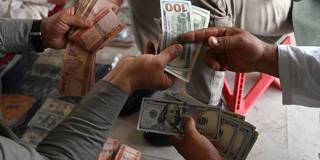In the half-century since US President Richard Nixon closed the curtain on the Bretton Woods system, the US dollar has been the dominant global currency, largely because there were no other aspirants to the throne. Nonetheless, recent events have reminded us that conditions can change both gradually and suddenly.
LONDON – This month marks the 50th anniversary of the end the Bretton Woods system, when US President Richard Nixon suspended the US dollar’s convertibility into gold and allowed it to float. We are also approaching the 20th anniversary of the Taliban’s removal from power in Afghanistan at the hands of US-led coalition forces. Now that the Taliban has again prevailed, we should consider whether its victory over the world’s most powerful military and largest economy will have any implications for the dollar and its role in the world.

LONDON – This month marks the 50th anniversary of the end the Bretton Woods system, when US President Richard Nixon suspended the US dollar’s convertibility into gold and allowed it to float. We are also approaching the 20th anniversary of the Taliban’s removal from power in Afghanistan at the hands of US-led coalition forces. Now that the Taliban has again prevailed, we should consider whether its victory over the world’s most powerful military and largest economy will have any implications for the dollar and its role in the world.